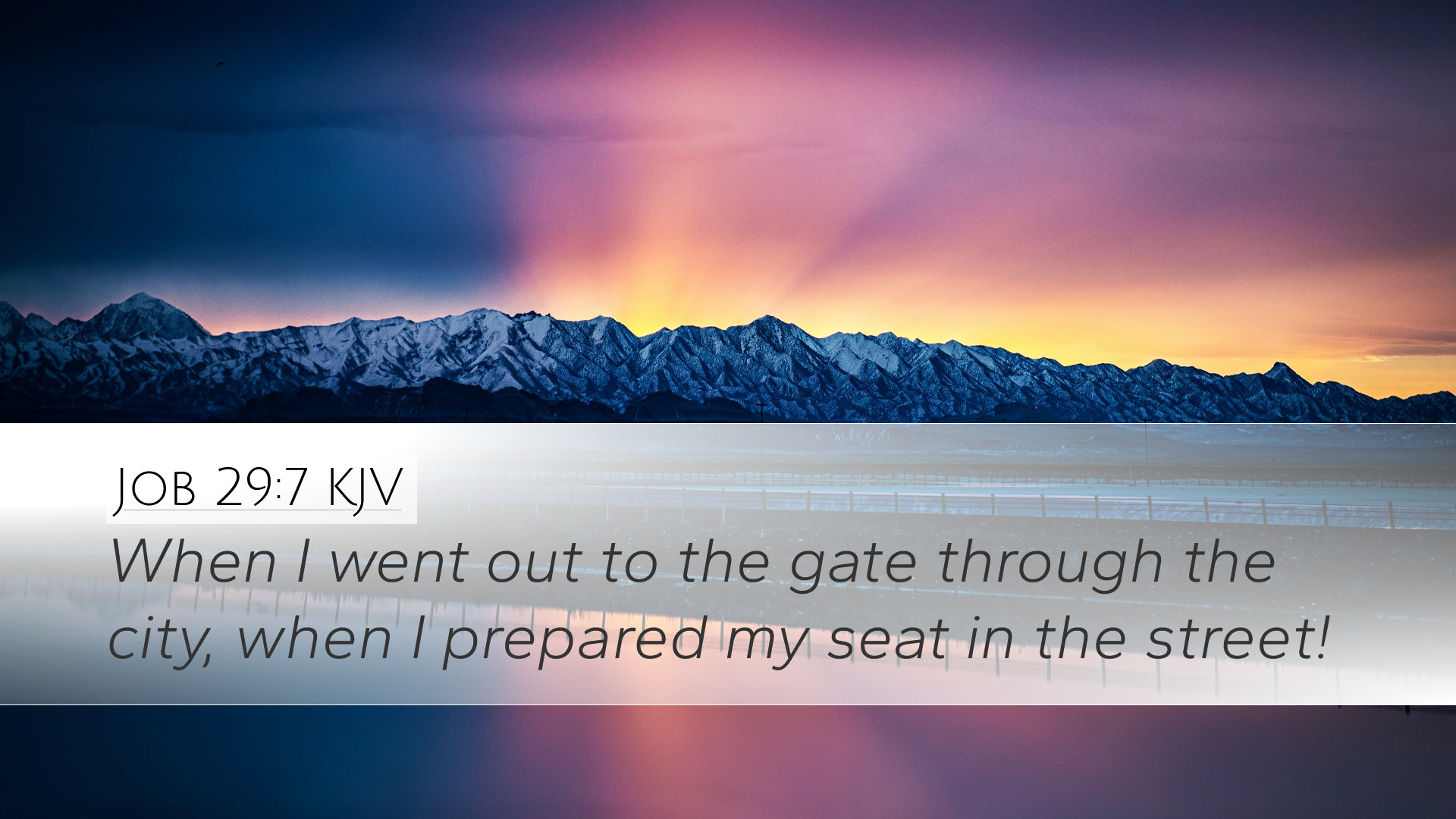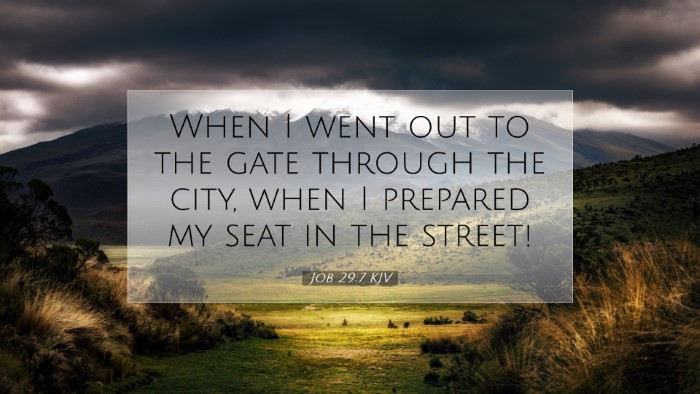Old Testament
Genesis Exodus Leviticus Numbers Deuteronomy Joshua Judges Ruth 1 Samuel 2 Samuel 1 Kings 2 Kings 1 Chronicles 2 Chronicles Ezra Nehemiah Esther Job Psalms Proverbs Ecclesiastes Song of Solomon Isaiah Jeremiah Lamentations Ezekiel Daniel Hosea Joel Amos Obadiah Jonah Micah Nahum Habakkuk Zephaniah Haggai Zechariah MalachiJob 29:7
Job 29:7 KJV
When I went out to the gate through the city, when I prepared my seat in the street!
Job 29:7 Bible Commentary
Commentary on Job 29:7
Verse Reference: Job 29:7 - "When I went out to the gate of the city, when I prepared my seat in the street!"
Introduction
This verse is situated in a section where Job reflects on his former state of honor and respect. It provides valuable insight into the characteristics of Job before his trials and serves as a pivotal point for understanding the contrast between his past glory and present suffering.
Contextual Background
Job, a man of great integrity, wealth, and societal standing, is lamenting his fall from grace. This reflection provides both historical context and emotional depth necessary for a profound understanding of his plight.
Public Perception and Honor
In ancient Near Eastern culture, the city gate functioned as a place of community gathering, decision-making, and social status recognition. Job describes his previous role as one of prominence and authority, suggesting he was deeply respected within the community. Albert Barnes notes that Job's presence at the gate indicates he was not only a leader but also a judge, actively involved in the civic matters of his city.
Analysis of the Text
This verse serves as a symbol of Job’s past as a respected elder. Job’s reminiscence highlights key themes such as:
- Authority: Job's position at the city gate signifies his authority and advisory role.
- Community Engagement: Job describes preparing a seat, indicating his active participation in community matters.
- Contrast with Present Suffering: This reminiscence starkly contrasts with Job's current desolation in the midst of his trials.
Insights from Commentators
Matthew Henry
Henry emphasizes that Job not only held a position of importance but was also a man known for his righteousness. He relays that Job’s experience at the gate symbolizes not just reputation but the deep respect he earned through his wise counsel and uprightness. Such observations point to the essential virtue of living a life that seeks the well-being of others and the community.
Albert Barnes
Barnes explicates that Job's declaration of preparing his seat in the street demonstrates a readiness to listen and adjudicate. In a broader context, it alludes to the greater responsibility that comes with authority—what it entails to lead with integrity. He suggests that Job had a close relationship with the needy and oppressed, serving as an advocate for their rights.
Adam Clarke
Clarke discusses the sociocultural importance of the city gate and highlights that it was a place where elders would meet to impart wisdom and settle disputes. His commentary raises the notion that leadership must be rooted in compassion and justice, which Job exemplified during his prosperous days. Job recalls not just his status but the benevolent relationships he fostered within the community.
Thematic Implications
This verse, while brief, serves as a powerful lens through which we can contemplate the nature of authority and respect within community life.
The Importance of Righteousness
Job's reflection on his past encourages readers to consider how their own lives may reflect righteousness and community responsibility. The themes of justice, wisdom, and compassion are critical, reminding modern readers and leaders alike of their duty toward others.
God’s Sovereignty in Human Affairs
Job's lamentation invites reflection on the paradox between human dignity and divine will. As Job extols his former status, it poignantly contrasts with his current sufferings, prompting an exploration of the reasons for suffering, God's plans, and human understanding.
Conclusion
Job 29:7 is not just a recount of a personal loss but a profound examination of community, respect, and the attributes of moral leadership. For pastors, students, theologians, and scholars, it serves as a foundation for discussions on ethical living, the nature of authority, and the complexities of human experiences in light of divine sovereignty.
Reflection Questions
- What can we learn from Job’s character that is applicable to leaders today?
- How does this verse relate to our understanding of suffering and divine justice?
- In what ways do we prepare our seats in the community, and how can we engage more meaningfully with others?


